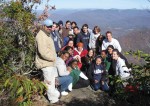When President George W. Bush recently named the Ecological Society of America (ESA) one of the recipients of the 2006 Presidential Award for Excellence in Science, Mathematics and Engineering Mentoring (PAESMEM), ESA's Strategies for Ecology Education, Development, and Sustainability (SEEDS) was recognized as being instrumental in winning the presidential award. "We view the ESA SEEDS Program as the jewel in our crown," said ESA President Norman Christensen. "It is truly one of the initiatives of which we are most proud and today's award underscores its tremendous value."
ESA is eager to continue developing its mutually beneficial relationship with LTER sites to offer exciting field trip and research opportunities for underrepresented students in ecology. In November 2006, Coweeta Hydrologic Laboratory joined the growing family of LTER sites to host a field trip through ESA's Strategies for Ecology Education, Development, and Sustainability (SEEDS) Program. Others include BES (November 2003), SEV (November 2005), KNZ (June 2006), SBC (October 2007), and BNZ (June 2008).
A recent article by Armstrong et al. (2007) highlights the SEEDS program and notes that underrepresented students rank family support, research experience, and a positive view of an ecology career as important factors in a student's decision to pursue an ecological career path. SEEDS field trips offer highly stimulating and engaging opportunities for students to interact with professional ecologists in a nurturing environment.
Seventeen students, two faculty advisors, and two coordinators made the trip to Coweeta Hydrologic Laboratory and the University of Georgia (UGA). Among those who welcomed them were Dean John Gittleman and ESA President Alan Covich. Students also discussed Graduate School opportunities at UGA with Curtis Byrd and Jessica Anderson.
The SEEDS students toured facilities at the Odum School of Ecology and made five stops at research sites around the Coweeta Basin during the weekend field trip. The stops highlighted land-use change projects, watershed function and process studies, the role of technology in ecosystem research, and the range of ecosystems present in the southern Appalachian Mountains. The group also visited the Cherokee Native American Museum in Cherokee, NC, to better appreciate the land ethic and land use of the Cherokee Nation, where Coweeta is located.
Beyond the field trip, two of the SEEDS students returned to Coweeta this year: Serge Farinas (Clayton State University near Atlanta, GA) was a summer research intern assisting in research comparing technologies used to measure long-term soil moisture; Fabiana Silva (New College in Sarasota, FL) began a one-year position at Coweeta to further develop the Education and Outreach programs at Coweeta.
According to one SEEDS student, LTER sites are ideal locations for students to "understand how doing long-term research is important to understanding ecological processes." It is also a great opportunity to expose LTER sites to a diverse user group and to potentially recruit students to the site's research and graduate programs. For more information about the SEEDS program, please visit http://esa.org/seeds.
Photo albums and complete field trip reports including student highlights and conceptual sketches are available online.
Reference
Armstrong, M.J., A.R. Berkowitz, L.A. Dyer, and J. Taylor. 2007. Understanding why underrepresented students pursue ecology careers: a preliminary case study. Frontiers in Ecology and the Environment 5: 415-420.
By Brian Kloeppel (CWT) and Teresa Mourad (ESA Education and Diversity Programs)

 Enlarge this image
Enlarge this image